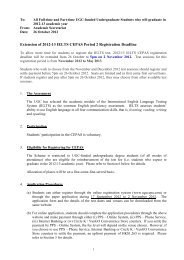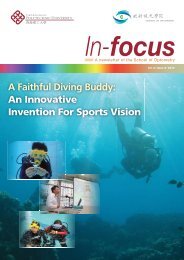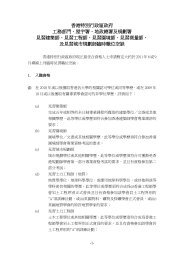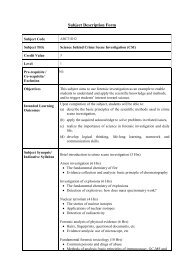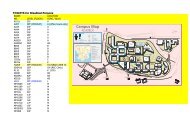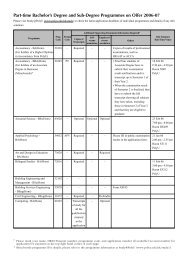CONSTRUCTION ENVIRONMENT - The Hong Kong Polytechnic ...
CONSTRUCTION ENVIRONMENT - The Hong Kong Polytechnic ...
CONSTRUCTION ENVIRONMENT - The Hong Kong Polytechnic ...
You also want an ePaper? Increase the reach of your titles
YUMPU automatically turns print PDFs into web optimized ePapers that Google loves.
LSGI successfully held its first Global<br />
Navigation Satellite System (GNSS)<br />
School at PolyU<br />
T h e G lo b a l N a v i g a t i o n<br />
Satellite System (GNSS)<br />
School on New GNSS<br />
Algorithms and Techniques<br />
for Earth Observations<br />
( n G A T E o ) 2 0 1 2 w a s<br />
successfully held on the<br />
P o l y U c a m p u s o n 1 4 -<br />
1 5 M a y 2 0 1 2 . H o s t e d<br />
b y t h e D e p a r t m e n t o f<br />
Land Surveying and Geo-<br />
Informatics (LSGI) and<br />
supported by the Faculty<br />
o f C o n s t r u c t i o n a n d<br />
Environment, the GNSS<br />
School was also sponsored by the International Association<br />
of Geodesy (IAG) and the International Association of Chinese<br />
Professionals in Global Positioning Systems (CPGPS).<br />
<strong>The</strong> first of its kind in <strong>Hong</strong> <strong>Kong</strong>, the GNSS School was one of<br />
a series of LSGI activities to celebrate PolyU's 75th Anniversary.<br />
Officiating the School were Professor Xiaoli Ding, Head and<br />
Chair Professor of LSGI, and Dr George Liu, Assistant Professor<br />
of LSGI.<br />
One of the fastest growing technologies in modern society, GNSS<br />
is an extension of Global Positioning System (GPS) technologies<br />
that integrates multiple satellite-based positioning systems,<br />
including the Chinese Beidou (Compass). With the present<br />
GNSS technology, it is technically feasible to instantaneously<br />
pinpoint any objects with an error of only a couple of millimeters<br />
to centimeters or even less. With the aims to enhance academic<br />
exchange between LSGI researchers and their international<br />
peers as well as provide in-school MSc/PhD students an<br />
opportunity to learn more about LSGI, nGATEo2012 offered all<br />
participants an excellent forum to network and update their<br />
knowledge in selected areas.<br />
<br />
<br />
<br />
<br />
<br />
<br />
<br />
<br />
<br />
<br />
<br />
<br />
(IAG) <br />
<br />
(CPGPS)<br />
<br />
<br />
<br />
<br />
(GNSS) (GPS)<br />
<br />
<br />
<br />
<br />
<br />
<br />
<br />
<br />
<br />
Chris Rizos <br />
<br />
<br />
<br />
86%<br />
97%83% 80%<br />
<br />
Five internationally distinguished scholars from Asia, Australia,<br />
Europe and USA were invited to give lectures during the twoday<br />
event. After Prof. Ding's opening remarks, an invited speech<br />
was delivered by Prof. Chris Rizos, President of IAG as well as<br />
Professor & Head of School of Surveying & Spatial Information<br />
Systems at the University of New South Wales in Australia. More<br />
than 50 international participants from academia, industry and<br />
government agencies in <strong>Hong</strong> <strong>Kong</strong>, mainland China, Australia,<br />
and Korea were in attendance, including many in-school MSc/<br />
PhD students from mainland China.<br />
<strong>The</strong> feedback from the GNSS School participants was very<br />
encouraging. A survey of them at the end of it showed that<br />
many found the GNSS School useful (86%), informative (97%),<br />
knowledgeable (83%), and interesting (80%). More than 85%<br />
participants indicated that they would attend a similar GNSS<br />
School in the future.<br />
44



